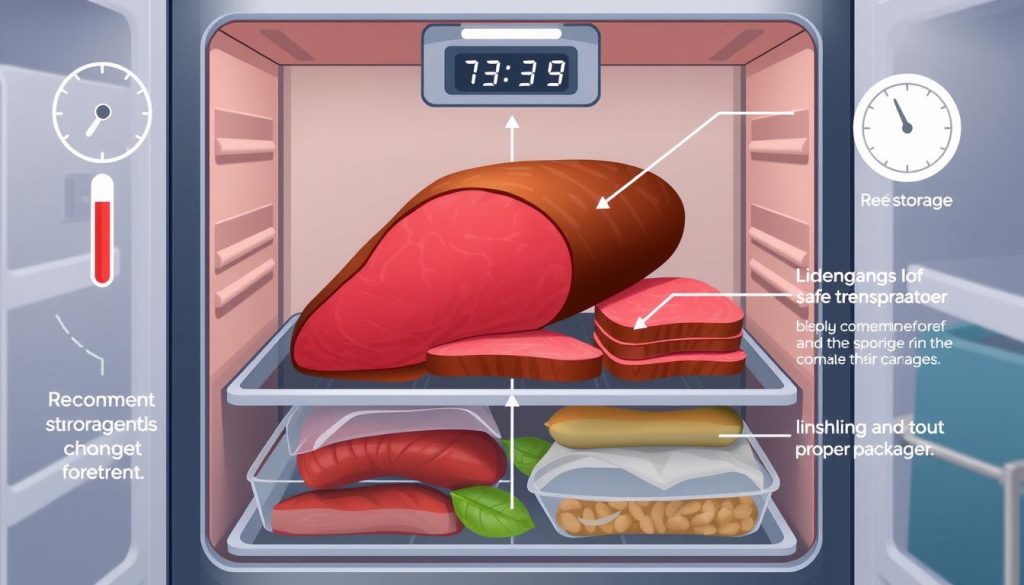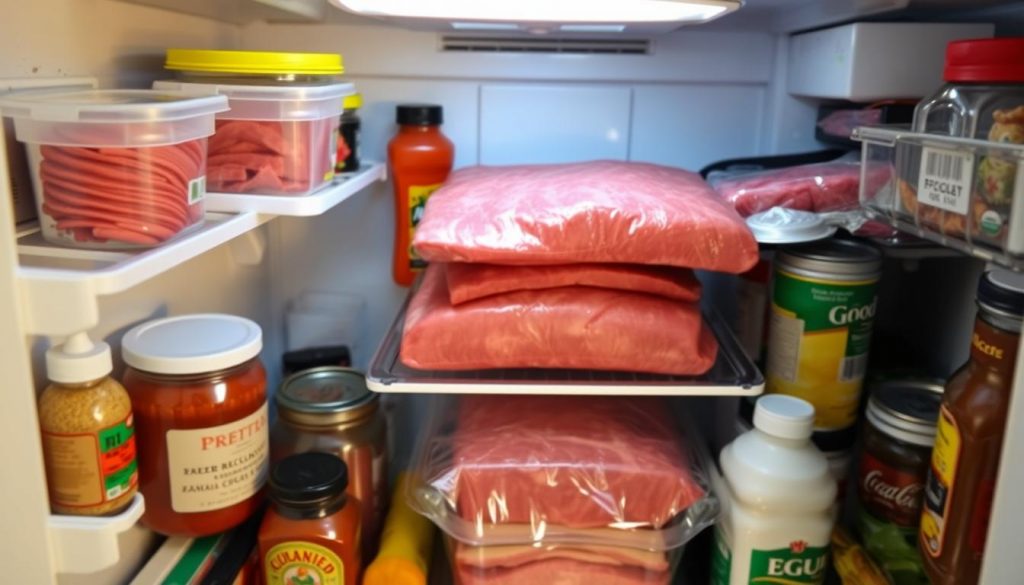Roast beef sandwiches are delicious, but knowing how long deli meat stays fresh is vital. Proper fridge storage keeps roast beef tasty and safe to eat. Let’s explore how to maintain its quality and ensure food safety.
The shelf life of sliced roast beef depends on its source and storage method. This guide covers best practices for both deli-counter and homemade roast beef. We’ll help you maximize your purchase while avoiding health risks.
Key Takeaways
- Proper refrigeration is vital for sliced roast beef freshness
- Storage duration varies for deli-sliced and home-sliced beef
- Airtight packaging helps extend shelf life
- Temperature control is crucial for food safety
- Recognizing spoilage signs is important to prevent foodborne illness
- Proper handling techniques can maximize roast beef longevity
Understanding Proper Storage of Sliced Roast Beef
Storing sliced roast beef correctly keeps it fresh and safe. Let’s look at the best ways to keep your deli meat tasty.
Optimal Temperature Settings for Refrigeration
The right fridge temperature is key for meat storage. Set it between 32°F and 40°F (0°C to 4°C). This slows bacterial growth and keeps your roast beef fresh.
Proper Packaging Materials and Methods
Good packaging keeps meat fresh. Use resealable bags or wrap it tightly in plastic or foil. Remove as much air as you can.
This prevents oxidation and freezer burn. It helps your roast beef last longer.
Air-Tight Container vs. Original Packaging
Original packaging works for short-term storage. Air-tight containers offer better protection for longer periods. They prevent moisture loss and protect against odors from other foods.
| Storage Method | Pros | Cons |
|---|---|---|
| Original Packaging | Convenient, maintains initial freshness | Limited protection, shorter shelf life |
| Air-Tight Containers | Better moisture retention, longer shelf life | Requires transfer from original packaging |
| Resealable Bags | Space-saving, customizable portions | Less rigid protection than containers |
These tips will help keep your sliced roast beef fresh. Follow them to enjoy safe, tasty meat for longer.
How Long Does Sliced Roast Beef Last in the Fridge
Keeping sliced roast beef fresh is crucial. Storage conditions and packaging affect its shelf life. Let’s explore how long refrigerated roast beef lasts.
Sliced roast beef stays fresh for 3-5 days in the fridge. This applies to deli meat and home-sliced beef. Store it at 40°F (4°C) or below for best results.
Here’s a breakdown of deli meat expiration based on different scenarios:
| Storage Method | Shelf Life |
|---|---|
| Opened package | 3-5 days |
| Unopened package | 7-10 days |
| Vacuum-sealed | Up to 14 days |
These are general guidelines. Always check for spoilage before eating. If you’re unsure about the quality, it’s best to throw it out.
Freezing can extend roast beef’s shelf life. Frozen sliced roast beef lasts 2-3 months while maintaining quality. Thaw it in the fridge and eat within 3-4 days.
Signs of Spoilage in Refrigerated Roast Beef
Spotting spoiled roast beef is vital for food safety. We’ll show you how to check beef quality and prevent meat contamination. Let’s explore key spoilage indicators.
Visual Indicators of Spoiled Beef
When examining your roast beef, look for these signs:
- Discoloration: Brown or gray patches
- Mold: Fuzzy growths in various colors
- Sliminess: Shiny or sticky surface
Smell and Texture Changes
Trust your senses when checking for spoilage:
- Odor: Sour or rancid smell
- Texture: Slimy or tacky feel
Dangerous Bacterial Growth Signs
Some signs of bacterial contamination include:
- Bubbles in the packaging
- Unusual gas or liquid build-up
- Off-putting chemical odors
| Spoilage Sign | Action Required |
|---|---|
| Slight discoloration | Use immediately if smell is normal |
| Strong odor | Discard immediately |
| Visible mold | Discard entire package |
| Slimy texture | Discard immediately |
If you’re unsure, it’s best to throw the beef out. Proper assessment helps avoid foodborne illnesses from contaminated meat.
Best Practices for Storing Deli-Sliced vs. Home-Sliced Roast Beef
Storing deli meat differs between store-bought and home-sliced beef. Let’s explore how to keep your roast beef fresh. We’ll cover both deli counter purchases and home-sliced options.
Deli-sliced roast beef often contains preservatives, extending its shelf life. Keep it in its original packaging for maximum freshness. Store it in the coldest part of your fridge. Use within 3-5 days after opening for best quality.
Home-sliced beef needs extra attention due to lack of preservatives. Wrap slices tightly in plastic wrap or use an airtight container. Add a paper towel inside to absorb excess moisture.
| Storage Method | Deli-Sliced Beef | Home-Sliced Beef |
|---|---|---|
| Packaging | Original packaging | Plastic wrap or airtight container |
| Refrigerator Location | Coldest part | Coldest part |
| Shelf Life | 3-5 days after opening | 2-3 days |
| Moisture Control | Not usually needed | Use paper towel to absorb moisture |
Proper temperature is vital for both types of roast beef. Set your fridge to 40°F (4°C) or below. This slows bacterial growth and keeps your beef safe.
Follow these storage tips to enjoy fresh, delicious roast beef longer. Your sandwiches will thank you!
Extending the Shelf Life of Sliced Roast Beef
Keeping sliced roast beef fresh is crucial. Let’s explore effective techniques for extending its shelf life. We’ll focus on vacuum sealing, temperature control, and moisture management.
Vacuum Sealing Methods
Vacuum sealing is a game-changer for meat preservation. It slows down bacterial growth by removing air from packaging. Here’s a simple process to follow:
- Place sliced roast beef in a vacuum-seal bag
- Use a vacuum sealer to remove air and seal the bag
- Label with the date for easy tracking
Temperature Control Tips
Proper fridge organization is key for maintaining the right temperature. Keep these points in mind:
- Store sliced roast beef at 40°F (4°C) or below
- Place meat in the coldest part of your fridge, usually the back
- Use a refrigerator thermometer to monitor temperature
Moisture Management Techniques
Controlling moisture is vital to preserving sliced roast beef. Try these methods:
- Pat dry slices before storing to remove excess moisture
- Use moisture-absorbing pads in storage containers
- Avoid storing near foods that release moisture
| Storage Method | Shelf Life | Best For |
|---|---|---|
| Vacuum Sealed | 7-10 days | Long-term storage |
| Airtight Container | 3-5 days | Short-term use |
| Original Packaging | 1-3 days | Immediate consumption |
These strategies can greatly extend your roast beef’s shelf life. By using them, you’ll keep your meat fresh and tasty for longer.
Food Safety Guidelines for Refrigerated Roast Beef

Proper meat handling prevents foodborne illness. USDA food safety guidelines keep roast beef safe and tasty. Let’s explore key tips for storing sliced roast beef.
Store sliced roast beef at 40°F or below. Use a thermometer to check your fridge’s temperature. Place meat in the coldest part, usually the back of the bottom shelf.
- Keep roast beef in airtight containers or wrapped tightly in plastic wrap or aluminum foil
- Use or freeze within 3-5 days of purchase or slicing
- Wash hands thoroughly before and after handling raw meat
- Clean cutting boards and utensils with hot, soapy water after use
Prevent cross-contamination by storing raw meats separately from ready-to-eat foods. Use different cutting boards for raw meats and vegetables. This stops bacteria from spreading.
When reheating, ensure roast beef reaches 165°F internally. Use a food thermometer to check the thickest part. These steps keep your roast beef safe to eat.
Tips for Buying and Storing Bulk Roast Beef
Buying roast beef in bulk can save you money and time. Let’s explore smart ways to portion, freeze, and thaw your large purchases.
Portioning Strategies
Split your roast beef into meal-sized portions before freezing. This makes thawing only what you need easier. Use a kitchen scale to measure portions based on your family’s needs.
Wrap each portion in freezer paper or vacuum-seal bags. This helps prevent freezer burn and keeps the meat fresh.
Freezing Options
Proper freezing is key to keeping roast beef quality. Remove as much air as possible from packaging to stop ice crystals.
A vacuum sealer works best for this. If you don’t have one, wrap tightly in plastic wrap, then aluminum foil.
Thawing Methods
Plan ahead when it’s time to use your frozen roast beef. The safest way to thaw is in the fridge.
Put the wrapped meat on a plate to catch drips. Allow 24 hours for every 4-5 pounds to thaw fully.
For quicker thawing, use the cold water method. Submerge the sealed package in cold water, changing it every 30 minutes.
- Never thaw meat on the counter at room temperature
- Use thawed roast beef within 3-4 days
- Don’t refreeze thawed meat unless it’s been cooked first
These tips will help you make the most of bulk meat shopping. Your roast beef will stay fresh and tasty for months.
Common Mistakes in Storing Sliced Roast Beef
Storing sliced roast beef incorrectly can lead to spoilage and waste. Let’s look at some common mistakes and how to avoid them.

Placing sliced roast beef on warm shelves or in the door speeds up spoilage. Store it in the coldest part of your fridge instead. This is usually the back of the bottom shelf.
Leaving roast beef in its original packaging is another error. Transfer it to an airtight container or wrap it tightly in plastic wrap. This prevents air exposure and keeps it fresh longer.
- Forgetting to label and date packages
- Storing roast beef next to raw meats
- Keeping sliced beef for too long
To help you remember safe storage times, here’s a handy guide:
| Type of Roast Beef | Refrigerator Storage Time | Freezer Storage Time |
|---|---|---|
| Deli-sliced | 3-5 days | 1-2 months |
| Home-cooked | 3-4 days | 2-3 months |
| Vacuum-sealed | 7-10 days | 6-8 months |
Avoiding these mistakes can extend the life of your sliced roast beef. Always trust your senses. If the beef looks or smells off, it’s best to throw it away.
Using Leftover Roast Beef Before Expiration
Don’t waste your roast beef! We’ve got tasty recipes and creative ideas to repurpose deli meat. These tips will help you reduce food waste and save money.
Let’s explore delicious ways to use up that aging roast beef in your fridge. You’ll be surprised by how versatile it can be!
Recipe Ideas for Aging Roast Beef
Transform your leftover roast beef into mouthwatering meals. Try these quick and easy recipes:
- Beef and veggie stir-fry
- Roast beef quesadillas
- Hearty beef and barley soup
- Savory beef stroganoff
Creative Ways to Repurpose
Get creative with repurposing deli meat to give your roast beef new life. Slice it thin for sandwiches or chop it up for salads.
You can dice it for omelets or use it as a pizza topping. This unique twist will add flavor to your favorite pie.
Safe Reheating Methods
When reheating leftover roast beef, safety is key. Use these methods to ensure your beef is heated thoroughly:
- Microwave: Heat in 30-second intervals, stirring between each
- Stovetop: Warm in a skillet over medium heat with a splash of broth
- Oven: Wrap in foil and heat at 350°F for 10-15 minutes
These tips will help you make the most of your roast beef. You’ll reduce food waste while enjoying delicious leftovers.
Get creative and have fun with your leftover roast beef. Your taste buds and wallet will thank you!
Conclusion
Proper storage is crucial for keeping roast beef fresh and safe. Refrigerate at the right temperature to extend shelf life. Use air-tight containers or wrap beef tightly to prevent spoilage.
Always check for signs of spoilage before eating. Look for changes in color, smell, or texture. These tips help you enjoy your roast beef longer and avoid waste.
Apply these guidelines to make the most of your sliced roast beef. These methods work for both deli-sliced and home-cut beef. Follow these tips to enjoy your roast beef safely and confidently.




